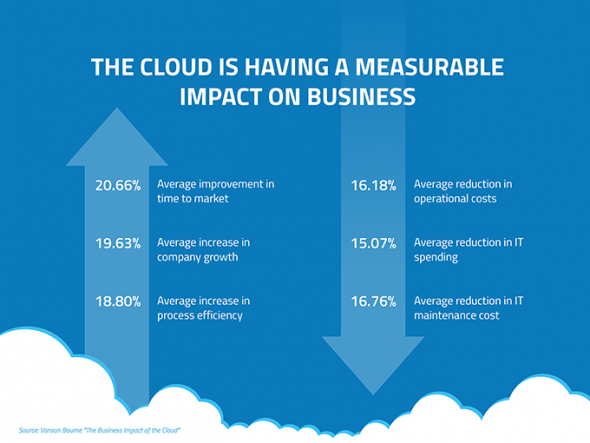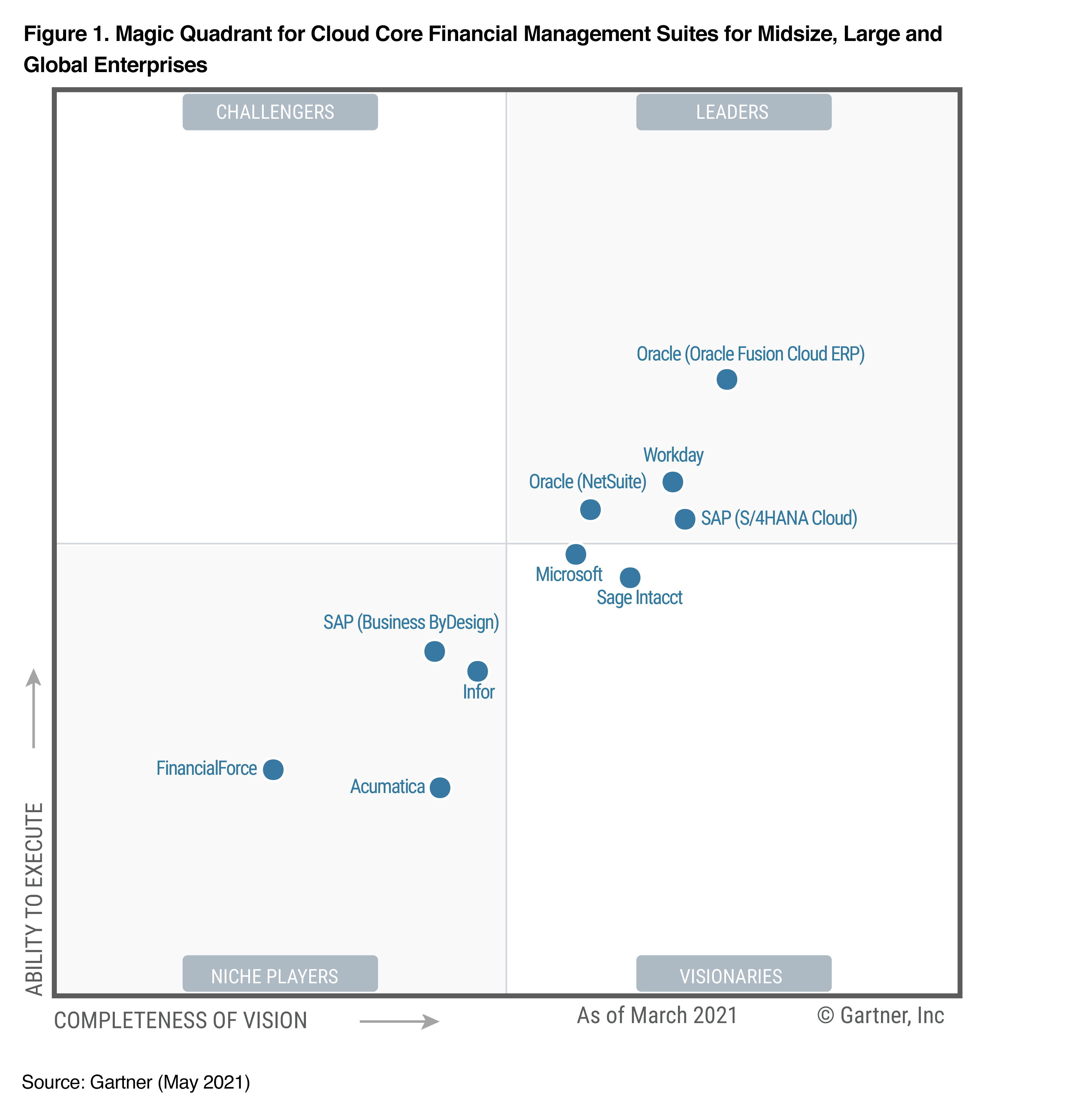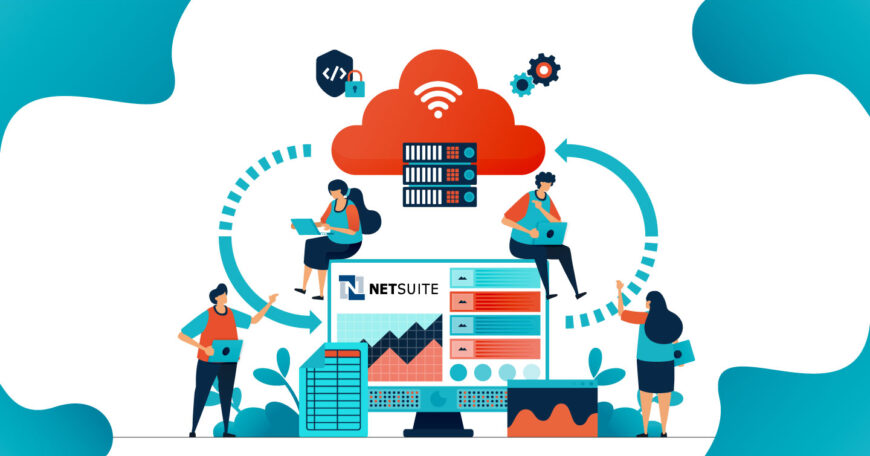Cloud based software as a service (SaaS) solutions have emerged as all new powerful tools to help companies make their operations better and ensure more business agility. From making informed and proactive business decisions to reducing infrastructure cost to limiting human errors, the impact of cloud powered ERP systems are too many. The ERP systems with cloud based SaaS models such as NetSuite are paving the way for transformation in many companies.
Gartner forecasts end-user spending on public cloud services to reach $396 billion in 2021 and grow 21.7% to reach $482 billion in 2022.
Additionally, by 2026, It will exceed 45% of all enterprise IT spending, up from less than 17% in 2021
The Cloud Advantages
Companies now choose cloud computing for several different reasons, such as reduced implementation cost, agility, wider customization scope, less reliance on IT hardware, etc. Let’s have a quick look at these cloud advantages in the context of ERP systems.

- Cloud ERP systems can run in a web browser and so no inhouse server infrastructure is required. This results in considerable cost savings for the company.
- Cloud based ERP implementation involves an interactive and iterative approach resulting in lesser errors and more efficiency.
- Cloud based ERP without a big IT infrastructure, requires less developer resources to further reduce the cost.
- ERP empowered by cloud computing does not require any support and maintenance charges as required by the on-premise ERP software solutions.
- Cloud ERP systems ensure optimum customization and they are highly scalable and flexible as per business requirements.
How Cloud ERP systems bring transformation?
Enterprise resource planning (ERP) systems offer great help to organizations in enhancing efficiency and productivity for all verticals and departments. For any business process a single integrated system delivering precise and up-to-date information creates a great value proposition. This becomes possible because of the combined power of ERP and cloud computing. NetSuite as the leading cloud based ERP system remains at the very forefront of this transformation.
Organizations are advancing their timelines on digital business initiatives and moving rapidly to the cloud in an effort to modernize environments, improve system reliability, support hybrid work models and address other new realities compelled by the pandemic.
Brandon Medford, senior principal analyst at Gartner.
Cloud ERP systems in several ways transform business processes. Some of the most important advantages and transformational abilities of cloud ERP systems include the following.
- Anytime access without IT infrastructure: Cloud ERP software solutions differ from regular on-premise ERP systems by ensuring access to business information anytime anywhere. On top of that, cloud ERP systems do not have IT infrastructure requirements. This enhanced accessibility coupled up with freedom from IT infrastructure requirements has positive implications on businesses.
- Consolidated businesses across locations: Businesses embrace cloud ERP systems also because of the ease of management for business operations spread across multiple locations. Cloud ERP systems help consolidate multiple business processes dispersed across locations into a single system. This ensures better control and enhanced visibility of the business processes. On top of everything, a consolidated management of business operations across locations also ensures zero manual errors and unmatched efficiency.
- Managing subsidiaries and branches with single IT resources: Another great advantage offered by cloud ERP systems like NetSuite is the smooth and streamlined management of multiple subsidiaries and branches without requiring to employ multiple IT staff in different locations. The integrated cloud ERP system can be accessed across all subsidiaries and branches without requiring additional resources and staff.
- Smooth ERP implementation: Smooth and easy implementation is a great advantage offered by the cloud ERP systems. In complete contrast to on-premise ERP systems, making business specific configuration of the ERP system becomes extremely easier. The business specific implementation also helps reduce time and development cost to a great extent. The only thing that remains similar with both on-premise and cloud ERP implementation is the need of establishing clear objectives and the important metrics.
The average budget per user for ERP software is $9000.
At all times when a company looks for hi-tech measures to make a process efficient, ensure workforce agility and mobility, make analytics better while reducing cost on IT infrastructure and resources, state of the art cloud ERP systems like NetSuite comes to our rescue. Irrespective of the types of enhancements and improvements you need, NetSuite ERP systems suit your requirements in all cases.
88% of organizations consider their ERP implementation helped them to succeed..
Selecthub
Why is the NetSuite ERP Implementation important?
Let us make one thing clear. Purchasing a cloud ERP software license is far from enough to avail the array of advantage that an ERP system offers. The most important thing after the purchase of a new ERP system is its implementation. The implementation process is the key to the success of an ERP software solution for a business. As every business is characteristically different, the custom implementation with business specific configuration is extremely important.
The long and strenuous implementation of the on-premise ERP system has been a big challenge for the employees. The longer and time consuming implementation also results in enhanced costing and business process delays. In this respect, NetSuite ERP systems come to the rescue to save businesses from such lengthy implementations. NetSuite implementation customized for businesses ultimately results in increased efficiency.
NetSuite Professional Services
Professional services offered by a robust ERP system like NetSuite ensures optimum flexibility. For custom NetSuite implementation, the professional services are configured by the custom implementation company to address the needs of the client organization.
Apart from creating financials and the accounts, companies also go after different layers of configurations as per different needs such as handling transactions with multiple currencies, consolidating various subsidiaries, etc. A NetSuite implementation company will be able to configure and customize the package of professional services as per the particular business needs.
NetSuite for improving business process
On its own, the NetSuite ERP system consists of organic best practices that can improve business processes. Through custom implementation, the NetSuite implementation company configures the software settings to address the specific business goals. In complete contrast to on- premise ERP systems, cloud ERP systems do not need software package installation or any hardware infrastructure. This frees up the IT resources and helps them to focus on core business objectives. NetSuite cloud ERP system helps a business determine particular objectives and tweak the entire system to achieve these goals.
The NetSuite implementation and NetSuite custom development company stands as the trusted advisor and service provider throughout the process.
It is widely known that small and mid-sized companies generally do not have in-house IT resources with the adequate experience to carry out full configuration required for fulfilling ERP objectives. This is where a NetSuite implementation service comes to their aid.
Why is the NetSuite Cloud ERP for Business Transformation?
NetSuite as the leading cloud ERP system plays a key role in business transformation. The easy implementation of the ERP is a key value proposition of NetSuite cloud ERP that makes it stand apart from traditional ERP systems. Through quick and business specific modifications and configuration changes one can easily adapt to a system and address the evolving business objectives, new business acquisitions, compliance norms and other changes.
The easy configuration and business specific implementation make the business transformation easier. Experienced NetSuite ERP consultants with years of experience and exposure in NetSuite implementation will help you configure the key aspects to meet business goals.
Oracle NetSuite Named a Leader in Gartner Magic Quadrant
In 2021, NetSuite is awarded a MQ leader for mid-size, large and global cloud core financial management in a new study by Gartner.
What does that mean?

1 – NetSuite has become a leading technological rival in a broad market.
2 – NetSuite is the ONLY leader in all areas, serving companies of any size.
3 – NetSuite has more cloud finance clients than any other quadrant solution.
4 – NetSuite is one of four Leaders Quadrant software suppliers.
5 – The completeness of the vision and capacity of NetSuite to perform has been recognised
Here are the top reasons to choose NetSuite ERP for business transformation.
- NetSuite stands as the first cloud ERP system in the world offering a comprehensive and integrated system taking care of all business processes and operations. NetSuite ERP system ensures business process automation by streamlining all key processes such as e-commerce, inventory, order fulfillment, CRM, financials, warehousing, supply chain management, professional services automation, etc.
- NetSuite ERP solution is highly scalable to empower customers to evolve with the business demands and other market dynamics.
- NetSuite comes as a fully managed SaaS solution that allows small and medium enterprises cut down cost on IT infrastructure and inhouse resources.
- NetSuite ERP system follows the industry acclaimed security standards and protocols to ensure optimum safety for data. NetSuite is also frequently updated to maintain stronger security.
- NetSuite ERP is highly configurable and easy to integrate with third-party applications. NetSuite uses APIs to integrate with other ERP and CRM systems like Salesforce, Magento, QuickBooks, and Microsoft Azure. Hence, users can leverage the full potential of NetSuite to streamline and automate business processes with NetSuite integration services.
- NetSuite ERP system by integrating multitude of segregated and legacy systems used by the company can provide relief from worries concerning compatibility and data transfer. The NetSuite system also ensures quick and real time data transfer and complete view of the data trajectory.
- NetSuite ERP system is powered by multiple hosting providers to make businesses free from worries regarding uptime, process silos, performance and continuity. This ultimately results in better end user experience.
- NetSuite also offers a varied set of solution packages or modules such as SuiteCommerce,, Advanced Revenue Management (ARM), financial modules, advanced warehouse management system (WMS), supply chain management (SCM) module, etc to take care of all processes and operational tasks.
- NetSuite ERP also provides powerful data analytics to help transform the business landscape and push digital transformation at a faster pace. NetSuite Suite Analytics keeps businesses updated with most relevant data driven insights, market trends and market updates.

Conclusion
NetSuite cloud ERP comes as the robust unified platform to deal with all business processes and departments ranging from Financials, Sales and Marketing. Starting from procurement and order handling to warehousing and inventory, to Human Resource management to supply chain management, from order fulfillment to e-commerce, from omnichannel marketing to CRM, NetSuite integrates every business process within an integrated system and allows customizing these modules as per business needs.
Related Posts
- Why Companies Are Moving To Cloud Financial Solutions?
- 6 Reasons why you should implement NetSuite ERP Services for your Business















